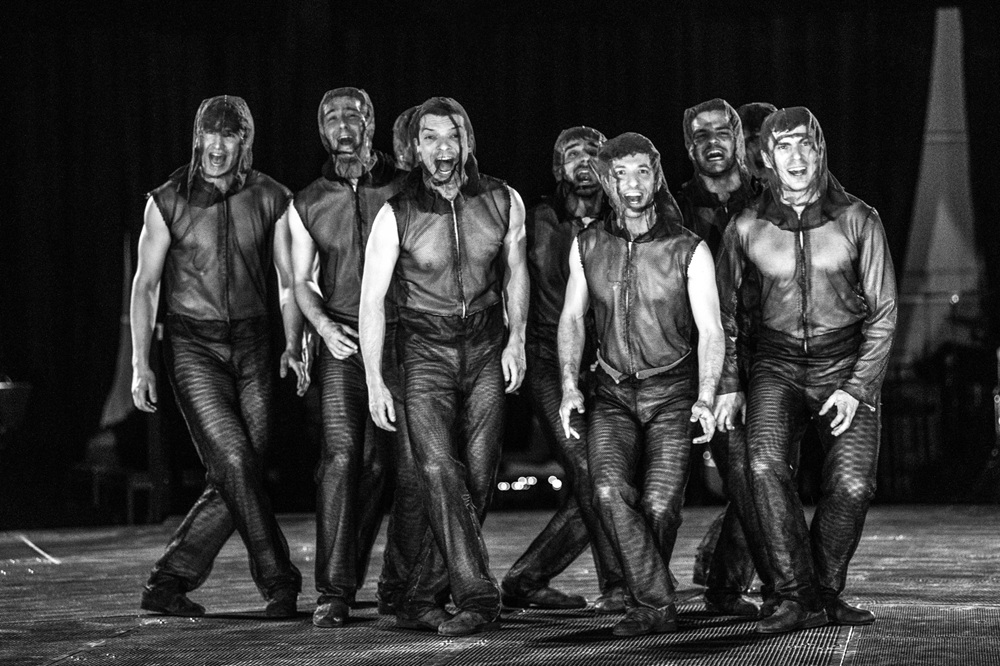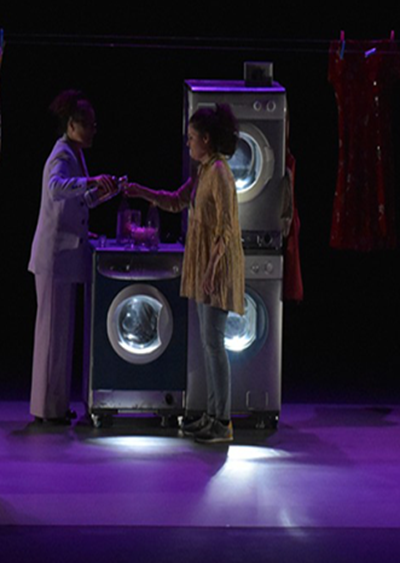
This year, the Epidaurus Festival welcomed theater lovers earlier than in previous years, hosting for a three-day period (June 27–29) the collaboration between the National Theatre of Greece and the German director Ulrich Rasche.
This was the second time the director presented his work on ancient tragedy at the Argolic theater, following the 2022 production of Aeschylus’s “Agamemnon,” a co-production of the Athens Epidaurus Festival and the Residenztheater of Munich.
In a three-day series of performances that attracted public interest but also sparked varied reactions, Ulrich Rasche engaged with the dialectic of one of Sophocles’ masterpieces, “Antigone.” By placing the Chorus members and actors on a continuously rotating stage, he highlighted the inevitability of Fate and attempted (often without avoiding monotony) to impart a rhythm to the movements and delivery of the lines that immersed the audience directly into the two opposing forces of the play: Creon and Antigone.
The scenographic approach proposed by Rasche, with the rotating platform, can be as complex and demanding for the actor as it is supportive of the vision of a director who, even though he makes cuts to roles and parts of the text (Ismene is notably absent, and there lies an “opening”—a challenge for future “readers” and “adapters” of the play), ultimately aims not at taking a political stance on stage but at revealing the positions of the characters involved.
This is precisely what the adaptation by the German director achieved in many respects, having as a valuable ally the language of Sophocles as restructured through the unparalleled translation of Nikos A. Panagiotopoulos. Despite the justified reservations one might have about the project, on the one hand, the uniqueness of the spectacle cannot be overlooked (since the scenography was specially adapted for the Epidaurus venue), and on the other hand, the willingness of the actors and Chorus members to serve such a demanding theatrical form is noteworthy.
In Rasche’s version of Sophocles’ masterpiece, the Chorus members consist of young men (instead of the usual elderly figures as in the original dramaturgy), which carries political connotations and reflects today’s warlike climate where the young citizen-soldier is called to survive. We should definitely highlight the voice of Dimitris Kapouranis as Haemon, who manages to break free from the generally detached tone of the performances during his confrontation with Giorgos Gallos’s Creon. Similarly, the performance of Filareti Komninou as Tiresias stands out tonally (providing temporary relief to the audience). It recalled theater of past eras—a tragedy that returns to Dionysian intensity and ecstasis, rather than the precise formalism of auteur directors like Rasche.
One of the “rare” moments for the theater of Epidaurus (both scenographically and conceptually), whose intellectual approach, while highlighting the timeless dialectical conflicts of the two central characters, often prevented it from connecting with the deeper emotions of the audience.
ΙΝFO
Translation Nikos A. Panagiotopoulos
Dramaturgy Antigone Akgün
Direction—Set design Ulrich Rasche
Music composition—Sound design Alfred Brooks
Costume design Angelos Mentis
Lighting design Eleftheria Deko
Chorus training and guidance Yannik Stöbener
Assistant director David Moser
Set design assistant Lukas Kötz
Dramaturg for the performance Eri Kyrgia
Music teacher Melina Peonidou
Assistant to the director Thomais Triantafyllidou
Assistant to the set designer Evangelos Agatsas
Assistant to the composer Giannis Arapis
Assistant to the lighting designer Nasia Lazou
Cast Giorgos Gallos Creon, Dimitris Kapouranis Haemon, Kora Karvouni Antigone, Filareti Komninou Tiresias, Thanos Tokakis Guard
Chorus Vassilis Boutsikos, Stratis Chatzistamatiou, Dimitris Kapouranis, Marios Kritikopoulos, Ioannis Mpastas, Giorgis Partalidis, Thanasis Raftopoulos, Gal Rompissa, Giannis Tsoumarakis, Giorgos Ziakas
Live music performance Nefeli Stamatogiannopoulou double bass, Haris Pazaroulas double bass Nikos Papavranoussis percussion Evangelia Stavrou percussion







Leave A Comment